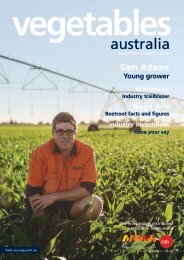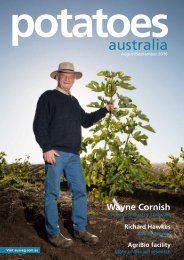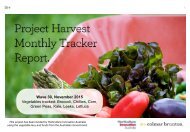vegetables
VA-MayJun2016
VA-MayJun2016
Create successful ePaper yourself
Turn your PDF publications into a flip-book with our unique Google optimized e-Paper software.
Sustainable<br />
Farming<br />
Focus<br />
39<br />
Protecting bees and wildlife<br />
MANY INSECTS, INCLUDING BEES, PROVIDE AN ESSENTIAL POLLINATION SERVICE AS A<br />
PART OF THE AUSTRALIAN FARMING ECOSYSTEM. VEGETABLES AUSTRALIA SPOKE WITH<br />
INDUSTRY EXPERTS ABOUT PROTECTING AND PROMOTING THESE IMPORTANT SPECIES<br />
FOR AUSTRALIAN AGRICULTURE.<br />
While overall farmed honey<br />
bee populations have<br />
been rising across the world,<br />
global honey bee populations<br />
remain under severe pressure<br />
due to factors including habitat<br />
loss, bee pests and pathogens<br />
such as the virulent viruses<br />
transferred by the Varroa mite.<br />
Australia remains free of the<br />
Varroa mite and some of these<br />
viruses, however we can ensure<br />
the continued protection of our<br />
bees by learning from overseas<br />
issues.<br />
Growers and beekeepers:<br />
keeping up-to-date<br />
“In Australia we have some<br />
of the healthiest honey bee<br />
colonies in the world, and it is<br />
important for us to do everything<br />
we can to keep it that way,” said<br />
CropLife Australia CEO Matthew<br />
Cossey.<br />
With this goal in mind,<br />
CropLife Australia and the<br />
Australian Honey Bee Industry<br />
Council have developed<br />
an app that facilitates<br />
communication between<br />
farmers and beekeepers. The<br />
‘BeeConnected’ app works by<br />
notifying registered farmers<br />
when beekeepers set up hives<br />
near their fields. Meanwhile,<br />
beekeepers can find out when<br />
crop protection products are<br />
being used.<br />
Industry R&D<br />
As part of investing in R&D for<br />
bees, Bayer produces a bee<br />
health magazine, BeeNow,<br />
which links agriculture and<br />
pollinators worldwide. The latest<br />
edition focused on a field station<br />
in England where integrated<br />
farm management techniques<br />
are being used to help honey<br />
bees, bumblebees and other<br />
wild bees flourish alongside<br />
good crop yields.<br />
The edges of tracks and<br />
fields at the station are lined<br />
with flowers and beetle banks.<br />
This helps to ensure that the<br />
farmland works as a suitable<br />
environmental habitat – not only<br />
for crops but for bees and other<br />
insects.<br />
This sort of investment in<br />
research allows benefits to<br />
flow on and protect crops<br />
in Australia from facing the<br />
same challenges as overseas<br />
agricultural practices.<br />
Helping honey bees<br />
Dr Ivor Davis, a Master<br />
Beekeeper and trustee of the<br />
British Beekeepers Association,<br />
makes recommendations for<br />
ways that everyone can help to<br />
preserve honey bees.<br />
1. Plant bee-friendly plants<br />
Single flowering plants and<br />
<strong>vegetables</strong> encourage honey<br />
bees to visit your crop. Bees<br />
like the allium family, all mints,<br />
beans, flowering herbs and<br />
daisy-shaped flowers.<br />
2. Use local honey and wash<br />
honey jars<br />
Honey from foreign countries<br />
can contain bacteria and spores<br />
that are very harmful to honey<br />
bees. Leaving such a jar outside<br />
encourages honey bees to feed<br />
on the remaining honey and this<br />
can result in the whole colony<br />
becoming infected.<br />
3. Find space for a beehive<br />
Many would-be beekeepers find<br />
it difficult to find a safe space<br />
for a colony of bees. Growers<br />
who have an appropriate space<br />
on their land are advised to<br />
contact the local beekeeping<br />
association. A beehive can<br />
make a significant difference to<br />
crop productivity health.<br />
4. Be bee friendly<br />
Bees are good neighbours when<br />
not provoked. If a bee is near<br />
you, do not agitate it with sharp<br />
movements. By staying calm<br />
and moving away slowly, the<br />
bee will soon lose interest.<br />
It is useful to note that bees<br />
do not like the smell of leather<br />
clothing or alcohol and regard<br />
dark clothing as a threat.<br />
They can also be confused<br />
by scented soaps, shampoos<br />
and perfumes.<br />
i<br />
For more information please<br />
visit beecare.bayer.com.<br />
The EnviroVeg Program<br />
is funded by Horticulture<br />
Innovation Australia Limited<br />
using the National Vegetable<br />
Levy and funds from the<br />
Australian Government.<br />
Project Number: VG12008








